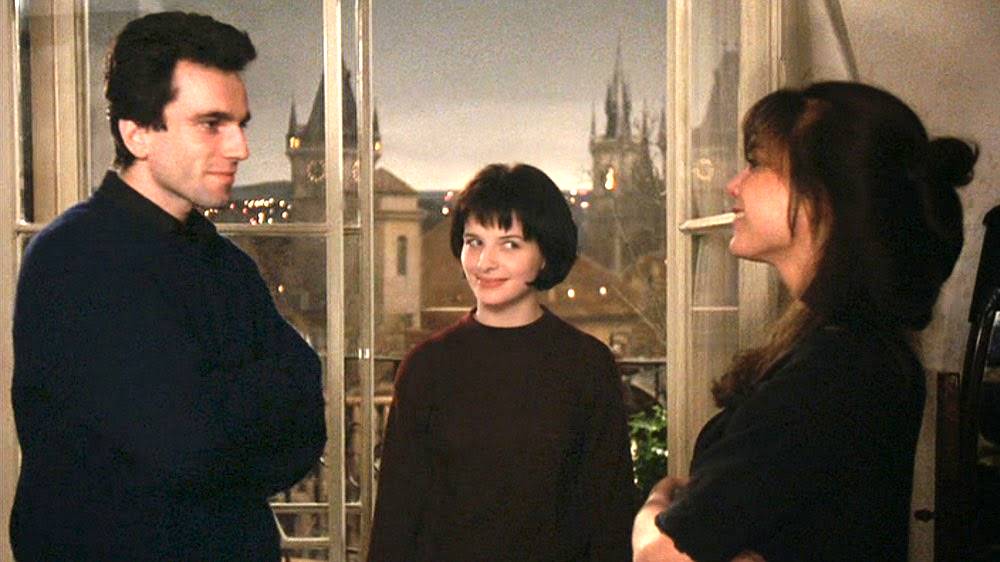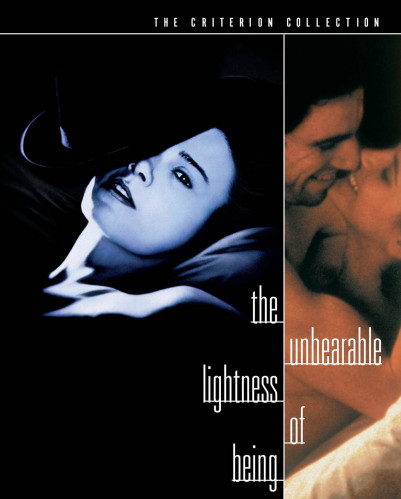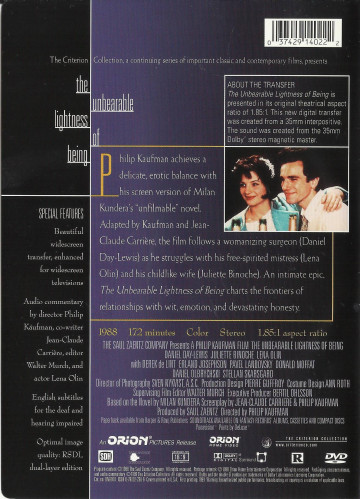THE UNBEARABLE LIGHTNESS OF BEING [1998] [The Criterion Collection] [DVD] [USA Release] On the Surface, an Intelligible Lie; Underneath, the Unintelligible Truth!
Philip Kaufman achieves a delicate, erotic balance with his screen version of Milan Kundera’s “unfilmable” novel. Adapted by Kaufman and Jean-Claude Carrière, the film follows a womanizing surgeon Tomáš [Daniel Day-Lewis] as he struggles with his free-spirited mistress Sabina [Lena Olin] and his childlike wife Tereza [Juliette Binoche]. An intimate epic, ‘THE UNBEARABLE LIGHTNESS OF BEING’ charts the frontiers of relationships with wit, emotion, and devastating honesty.
“The Unbearable Lightness of Being” is a well-made film from the pen of Czech novel written by Milan Kundera, one of the most prominent names of the Czech and French literature. Published in English in 1984, its plot is closely linked to the “Prague Spring” in 1968. It depicts the love between 4 men and women who show different attitudes toward life around the backdrop of the Soviet invasion of Prague in 1968; thus, this piece explores the artistic and intellectual life of Czech society.
The Criterion Collection is dedicated to gathering the greatest films from around the world and publishing them in editions of the highest technical quality. With supplemental features that enhance the appreciation of the art of film.
FILM FACT No.1: Awards and Nominations: 1988 British Society of Cinematographers: Nominated: Best Cinematography Award for Sven Vilhem Nykvist. 1988 Los Angeles Film Critics Association Awards: Nominated: LAFCA Award for Best Cinematography for Sven Vilhem Nykvist. 1988 National Board of Review, USA: Win: NBR Award for Top Ten Films. 1988 New York Film Critics Circle Awards: Nominated: NYFCC Award for Best Film 4th Place. Nominated: NYFCC Award for Best Cinematography Sven Vilhem Nykvist. 1989 Academy Awards®: Nominated: Best Writing, Screenplay Based on Material from Another Medium for Jean-Claude Carrière and Philip Kaufman. Nominated: Best Cinematography for Sven Vilhem Nykvist. 1989 BAFTA Awards: Win: BAFTA Film Award for Best Screenplay – Adapted for Jean-Claude Carrière and Philip Kaufman. 1989 American Society of Cinematographers: Nominated: ASC Award for Outstanding Achievement in Cinematography in Theatrical Releases for Sven Vilhem Nykvist. 1989 Boston Society of Film Critics Awards: Win: BSFC Award for Best Cinematography Sven Vilhem Nykvist. Win: BSFC Award for Best Actor for Daniel Day-Lewis. 1989 Film Independent Spirit Awards: Win: Independent Spirit Award for Best Cinematography for Sven Vilhem Nykvist. 1989 Golden Globes: Nominated: Best Motion Picture in a Drama. Nominated: Best Performance by an Actress in a Supporting Role in a Motion Picture for Lena Olin. 1989 National Society of Film Critics Awards, USA: Win: NSFC Award for Best Film. Win: NSFC Award for Best Director Philip Kaufman. Nominated: NSFC Award for Best Supporting Actress Lena Olin. Nominated: NSFC Award for Best Cinematography Sven Vilhem Nykvist. 1989 Writers Guild of America: Nominated: WGA Award (Screen) for Best Screenplay Based on Material from Another Medium for Jean-Claude Carrière and Philip Kaufman. 1990 USC Scripter Award: Nominated: USC Scripter Award for Jean-Claude Carrière (screenwriter), Philip Kaufman (screenwriter) and Milan Kundera (author).
FILM FACT No.2: The film was an American production with an American director, Philip Kaufman, but it features a largely European cast. It was filmed in France; in the scenes depicting the Soviet invasion, archival footage is combined with new material shot in Lyon. The scene in which Tomas has sex with a woman while cleaning windows was shot in the then unrestored Hôtel de Beauvais in the 4th arrondissement of Paris (now the Administrative Appeal Court). Author Milan Kundera served as an active consultant during the making of the film. Kundera wrote the poem that Tomas whispers into Tereza's ear as she is falling asleep specifically for the film. However, in a note to the Czech edition of the book, Milan Kundera remarks that the movie had very little to do with the spirit either of the novel or the characters in it. In the same note Kundera goes on to say that after this experience he no longer allows any adaptations of his work. Many critics have focused on how much of the book was successfully captured, or could be captured, on film; however, some commentators, such as Cattrysse Patrick, have argued that the film must be viewed in a different light, with the book as only one source of inspiration. “The Unbearable Lightness of Being,” Czech Nesnesitelná lehkost bytí, novel by Milan Kundera, first published in 1984 in English and French translations. In 1985 the work was released in the original Czech, but it was banned in Czechoslovakia until 1989. Through the lives of four individuals, the novel explores the philosophical themes of lightness and weight.
Cast: Daniel Day-Lewis, Juliette Binoche, Derek de Lint, Erland Josephson, Pavel Landovský, Donald Moffat, Daniel Olbrychski, Stellan Skarsgård, Tomasz Borkowy, Bruce Myers, Pavel Slabý, Pascale Kalensky, Jacques Ciron, Anne Lonnberg, László Szabó, Vladimír Valenta, Clovis Cornillac, Leon Lissek, Consuelo De Haviland, Jacqueline Abraham-Vernier, Judith Atwell, Claudine Berg, Jean-Claude Bouillon, Miroslaw Beuer, Niven Busch, Margot Capelier, Victor Chelkoff, Monica Constandache, Jean-Claude Dauphin, Dominique De Moncutt, Bernard Lepinaux, Josiane Lévêque, Peter Majer, Charles Millot, Gérard Moulévrier, Jan Nemec, Charly Oleg, Sylvie Plantard, Olga Baïdar-Poliakoff, Christine Potter, Hana Maria Pravda, Romano, André Sanfratello, Jiri Stanislav, Milos Szoboda, Helenka Vernier, Marrian Walters, Serge Delanoue (uncredited), Philip Kaufman (uncredited) and Isabelle Noérie (uncredited)
Director: Philip Kaufman
Producers: Bertil Ohlsson, Paul Zaentz and Saul Zaentz
Screenplay: Milan Kundera (novel), Jean-Claude Carrière (screenplay) and Philip Kaufman (screenplay)
Composer: Mark Adler
Costume Design: Ann Roth
Cinematography: Sven Vilhem Nykvist (Director of Photography)
Image Resolution: 1080i (Technicolor)
Aspect Ratio: 1.85:1
Audio: English: 2.0 Dolby Digital Stereo Audio
English: 3.0 Dolby Digital Audio
Subtitles: None
Running Time: 171 minutes
Region: NTSC
Number of discs: 1
Studio: M-G-M / Orion Pictures / The Criterion Collection
Andrew’s DVD Review: ‘THE UNBEARABLE LIGHTNESS OF BEING’ [1998] is set in the Spring of 1968, and Tomáš is a young surgeon in Prague, who enjoys a freewheeling life that has physical relationships with several women and is not bound by any one. This womanizer runs into Tereza, a waitress in a hot spring town where he visited a patient. Tereza, who came to Prague in search of Tomáš as if she were led by fate, stays with him at his house. Although Tereza gradually adjusts to life in Prague by getting a job as a photographer through Sabina, another of Tomáš's lovers. Life in Prague is very light and unbearable itself, Tereza suffers from Tomáš's lightness.
One day, tanks from the Soviet Union come in to stop the "Prague Spring" and Tereza becomes involved in activist photojournalism showing the Soviet army's oppression and the citizens resisting it. Disenchanted with the disastrous reality, Tomáš and Tereza escape across the Czech border to neutral Switzerland. Meanwhile, Sabina, who defected to Switzerland earlier than Tomáš and Tereza, who falls in love with a married professor named Franz [Derek de Lint]. However, Tereza runs away when Franz finally leaves his wife and comes to Tereza. Sabina lives her life as an extreme example of lightness, taking profound satisfaction in the act of betrayal.
As time goes by, Tereza realized that she could no longer afford Tomáš's light lifestyle, so she returns to the Czech Republic on her own. Below is the famous line from the novel that Tereza wrote to Tomáš when she left him behind in Switzerland.
“I know I have to help you. But I can't do that. I'm not helping you, I'm becoming a burden. Life is too heavy for me. But it's too light for you. I can't stand this lightness, this freedom. I'm not that strong. In Prague, I only needed your love, but in Switzerland, I relied on you for everything. What would happen if you abandoned me? I'm a weak man. I go back to the country of the weak. Bye.”
Tomáš quickly realizes that he wants to be with Tereza and follows her home. However, at that time, the political situation in Prague is more rigid, and the lives of the two gradually erode amid political turbulence. So, fed up with life in Prague under the communist regime, they move to the countryside and where their social circumstances plummet, like Tomáš from surgeon to window cleaner and farm truck driver, Tereza from photographer to farmer. This reflects the typical social decline of the Czech intellectuals in the 1970’s, and with the story that unfolds, which mainly deals with the “Prague Spring,” and is also about the philosophical story in multiple dimensions including love, sexuality, the complexity of the being, and politics.
As described, the main four characters embody the lightness and weight of being — Tomáš's hesitation between the faithfulness for Tereza and freewheeling relationships with many women; Tereza entirely devoted to his husband Tomáš but exhausted later; Sabina (Tomáš's lover) does as she pleases and faces no consequences; and Franz (Sabina’s other lover) is an idealist and seeker of meaning — all perfectly symbolize the weight of being. In the whirlwind of love, sex, history, and ideology, they realize that human beings are intolerably light only after a long period of wandering. That is to say, Milan Kundera wanted to reveal the limits of human existence ultimately by revealing the contradictory and dual nature of love; the seriousness and lightness of love, the responsibility, and freedom of love, and the eternal love and instantaneous love through the four contrasting and stereotyped characters.
Furthermore, throughout the lives of these four intellectuals, who were the main instigators of the "Prague Spring," thus suffering from the soviet counter-attack, writer Milan Kundera tells us his own story as well, that Milan Kundera and thousands of other Czech intellectuals had to face and endure “the exile.” Like Tomáš, Tereza and Sabina who fled to Switzerland after the soviet invasion. As Milan Kundera said, “ideas had the force of a bomb exploding” quoted from the novel, Milan Kundera was considered one of the instigators around those events and eventually was forced to emigrate to France in 1975 still lived there almost 90 years of age in France. Milan Kundera saw no difference between communism and Nazism, believing that they both deprive the individual in favour of the primacy of the collective.
The film ‘THE UNBEARABLE LIGHTNESS OF BEING’ is very extremely relevant in the 21st Century, especially with the backdrop of the Soviet Union illegally invading Czechoslovakia and especially Prague in 1968 by the nasty evil Soviet army's oppression and illegally deposing reformist Alexander DubÄÂek who was elected First Secretary of the Communist Party of Czechoslovakia. Well I think it is very apt for this film, and once again the Soviet Union has illegally invaded Ukraine, but this time by the evil misogynous dinosaur Putin and making him a war criminal and should be taken to court for the horrendous rape of a civilised country of Ukraine.
* * * * *
DVD Image Quality – M-G-M, Orion Pictures and The Criterion Collection presents us the film ‘THE UNBEARABLE LIGHTNESS OF BEING’ with a 1080i presentation and a 1.85:1 aspect ratio, but some reviewer’s say it is actually a 1.78:1 aspect ratio, well they are totally wrong. This new digital transfer was created from a 35mm interpositive. The video presentation found here has never been particularly great, and it really shows its age now. Though longer films are problematic on DVD this one seems particularly bad, loaded with noticeable compression and noise. Edge halos and edge enhancement are also problematic, popping out harshly at its worst. Colours are actually fairly strong, if sometimes slightly muted. The print is also in very good shape, but can be present a number of defects including dust and debris littered throughout along with quite a number of scratches, especially when you get to the black-and-white sequences in the film. Overall, for a DVD presentation, I think the quality of the image presentation is really very good, and despite what some reviewers saying it was an atrocious image quality, well they definitely are talking a right load of rubbish.
DVD Audio Quality – M-G-M, Orion Pictures and The Criterion Collection brings us the film ‘THE UNBEARABLE LIGHTNESS OF BEING’ with a 2.0 Dolby Digital Stereo Audio experience and was created from the 35mm Dolby stereo magnetic master and is actually a pleasant surprise. Though I found dialogue weak and fairly hollow, music is loud and lively with terrific depth and range. The surrounds actually get quite a good workout as well, and especially handling music and some of the background sounds in the film. The invasion sequence is particularly impressive, with tanks, yelling, shots, and explosions filling out the environment and moving quite naturally between the speakers. It’s a shockingly active audio track.
* * * * *
DVD Special Features and Extras:
Special Feature: Audio Commentary featuring Philip Kaufman, Jean-Claude Carrière, Walter Murch, and Lena Olin [1998] [1080i] [1.85:1] [172:05] With this featurette, this audio commentary was recorded exclusively for The Criterion Collection I 1998, and features director Philip Kaufman, co-writer Jean-Claude Carrière, editor Walter Murch, and actress Lena Olin. To access the audio commentary while viewing the movie film ‘THE UNBEARABLE LIGHTNESS OF BEING,’ first go to the menu and click on the item that says “audio commentary” and the film will start automatically as well as the audio commentary, which will be heard in 3.0 Dolby Digital Audio, which I find very strange and have never heard this type of audio presentation for an audio commentary. First to comment about the film is director Philip Kaufman and first starks to talk about the Lothario character that Daniel-Day Lewis plays and then slowly talks about the other actors in the film, and Philip Kaufman also talks about how he likes to shoot certain scenes in the film and we also slowly hear from the other participants begin making their comments relating to the film, and also comment about a lot of background information and also talk about what went on behind-the-scenes and also talk about what it was like to work with everyone. For the most part the audio commentary is very informative and fairly entertaining. Philip Kaufman has the bulk of the audio commentary track, and deservedly so. Philip Kaufman also talks about what he was trying to cover in the film, the process of adapting the complicated novel and working with the author Milan Kundera, who liked the film “very very very very” much. They also cover the politics of the time and during the filming of the movie. Apparently they could not shoot any of the Russian invasion sequences in Prague so they filmed it in France, and if it wasn't for the fact it’s mentioned I would never have noticed that they had used backdrops for some sequences. Lena Olin has a little bit to say but not much and offers her opinions on the novel and also what it was like filming many of the scenes in the film, namely nude scenes. Even though it is a long audio commentary, but The Criterion Collection, who edits all of the participants together, has put it together nicely and keeps the track moving along and well worth listening to. Near the end of the film, we see Daniel-Day Lewis and Juliette Binoche in the truck driving on the road through the wooded forest and director Philip Kaufman and explains in detail what the actual scene is not what it seems, especially right at the end of the film the screen goes completely white and you will have to hear director Philip Kaufman’s long explanation of that part at the end of the film. Please Note: due to the limited amount of space provided for my Blu-ray Reviews, these audio commentaries have had to be edited quite a lot, so I hope this will not disappoint your enjoyment in my review of this particular audio commentary.
PLUS: We get supplied a two sided printed booklet written by Michael Sragow, who covers the depths of the characters and the impact of the film. If you want to avoid any real spoilers before viewing the movie it would probably be best to not read it until after the film.
Finally, the conclusion of ‘THE UNBEARABLE LIGHTNESS OF BEING’ is about the 1960’s Czechoslovakia, Tomáš, an oversexed Prague surgeon, marries Tereza, a beautiful, waiflike country girl. Even though he has taken a vow of fidelity, Tomáš continues his wanton womanizing, notably with his mistress Sabina. Escaping the 1968 Russian invasion of Prague by heading for Geneva, Switzerland, Sabina takes up with another man and unexpectedly develops an unlikely yet stimulating friendship with fellow refugee Tereza. Meanwhile, Tomáš, who previously had been interested only in sex, becomes politicized by the fall of Alexander DubÄÂek and the collapse of the Czechoslovakia leader's unique brand of limited democracy within the communist system. Based on the novel by Milan Kundera and held that the theories of both Nietzsche and Parmenides are false, as both the “light” and “heavy” characters meet unhappy fates. Furthermore, he demonstrated how unbearable it is that each choice can only be made once with one possible result and that no one can ever know what other choices would have wrought. Upon its initial publication in English and French (L’Insoutenable Légèreté de l’être), the novel enjoyed international popularity, especially after the release of the acclaimed 1988 film adaptation. Highly Recommended!
Andrew C. Miller – Your Ultimate No.1 Film Aficionado
Le Cinema Paradiso
United Kingdom



